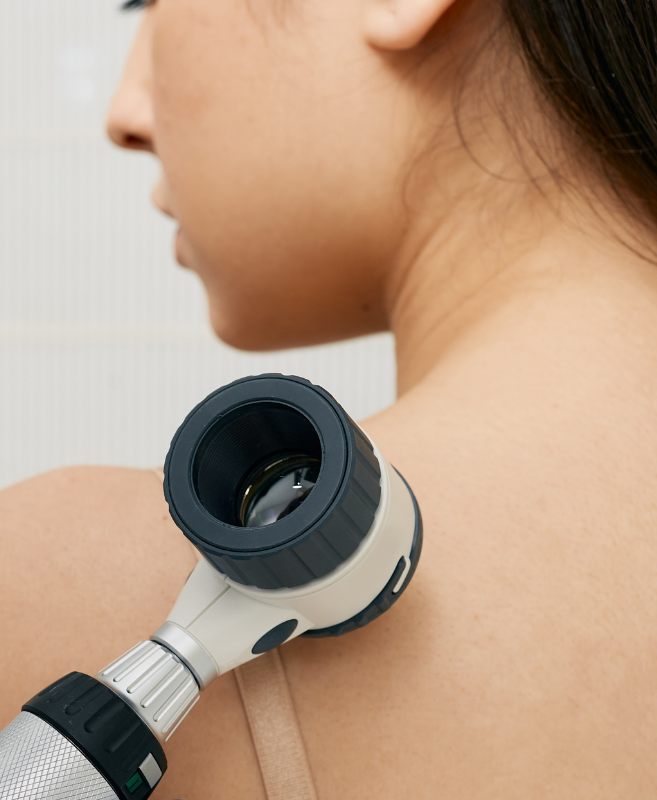
Skin cancer aftercare & monitoring in Berkshire, London and Surrey.
Skin Cancer Aftercare and Long-Term Monitoring in Berkshire
Recovery support. Ongoing surveillance. Consultant-led care you can trust.
Your Care Doesn’t End After Treatment
Treatment for skin cancer does not end with surgery or non-invasive therapies. Ongoing monitoring is essential to detect any signs of recurrence, support optimal healing, and protect long-term skin health.
At Apex Skin Clinic, our consultant dermatologists, plastic surgeons, and skin cancer nurse specialists provide structured aftercare and surveillance tailored to your diagnosis and risk level.
Based at Berkshire Grove Hospital, our private skin cancer aftercare service is available to patients from Windsor, Eton, Marlow, Ascot, Slough, and across Berkshire, London, and Surrey. Whether you have been treated for melanoma, squamous cell carcinoma (SCC), basal cell carcinoma (BCC), or a pre-cancerous skin condition, we are here to support your recovery and peace of mind.
Ongoing Monitoring & Skin Surveillance
Monitoring for recurrence or new lesions is an essential part of skin cancer care. If you’ve been treated for melanoma, high-risk BCC/SCC, or Bowen’s Disease, we may recommend a personalised surveillance plan, which can include:
-
Every 3–12 months depending on your condition
Consultant- or nurse-led full body reviews
Focus on previously affected area
-
Digital mole mapping allows us to track mole changes over time
Ideal for patients with atypical moles, a history of melanoma, or numerous lesions
-
If you’ve had a sentinel node biopsy or lymph node clearance, we’ll monitor for regional recurrence or swelling
May include ultrasound or clinical review
-
Education around UV exposure, suncream use, and self-examination
Support for developing daily sun-safe habits
What to Expect After Treatment
Following any skin cancer treatment- whether a minor lesion excision or a complex flap reconstruction- you will receive clear post-operative care instructions tailored to your procedure. This includes guidance on wound care, skin protection, and scar management, as well as a personalised dressing plan with support from our specialist nursing team.
Where appropriate, we provide advice on scar care techniques such as massage or the use of recommended creams. We also offer education on sun protection and steps to reduce future skin cancer risk. Your consultant will take the time to explain how to check your skin at home, what to look out for, and when to return to the clinic if anything changes.
Long-Term Monitoring and Skin Cancer Surveillance
Many patients benefit from continued skin cancer surveillance, particularly those considered at higher risk of recurrence or new lesions. Ongoing monitoring may be recommended if you have previously been diagnosed with melanoma, high-risk basal cell carcinoma, or squamous cell carcinoma. Other risk factors include a history of frequent sun exposure or use of tanning beds, a large number of moles or atypical mole patterns, a weakened immune system, or a family history of skin cancer. At Apex Skin Clinic, we tailor our surveillance plans to your personal risk profile to support early detection and peace of mind.
Who Is Ongoing Monitoring Recommended For?
Ongoing care is often advised for individuals with a personal or family history of melanoma or non-melanoma skin cancer, as well as those previously diagnosed with early-stage squamous cell carcinoma (SCC), Bowen’s disease, or advanced basal cell carcinoma (BCC). Patients who are immunosuppressed, whether due to medications, organ transplantation, or underlying health conditions, may also benefit from long-term surveillance. Additional indications include a history of radiation therapy, extensive sun damage, or the presence of more than 50 moles. Patients who have previously undergone mole mapping may require periodic reassessment to track changes over time and ensure early detection of any new concerns.
Frequently Asked Questions
-
Not always. Many patients only need short-term follow-up. If your condition was high-risk or you’ve had melanoma, a longer plan may be recommended.
-
Yes- and we encourage it. Our team will show you how to perform self-checks and what to look out for. Early reporting often means simpler treatment.
-
Watch for new or changing lesions, particularly around the treatment site. Look for itching, bleeding, colour change, or an open sore that does not heal.
-
Your consultant will guide you through next steps, which may include further imaging, biopsy, or surgery if required.
Book Your Consultation
If you are worried about a mole, skin lesion, or changing area of skin, our team is here to help. We offer clear diagnosis, expert treatment, and continued care in a calm, professional environment. Whether you are seeking a skin cancer diagnosis and treatment plan or simply want reassurance, we will guide you with expertise and compassion.
